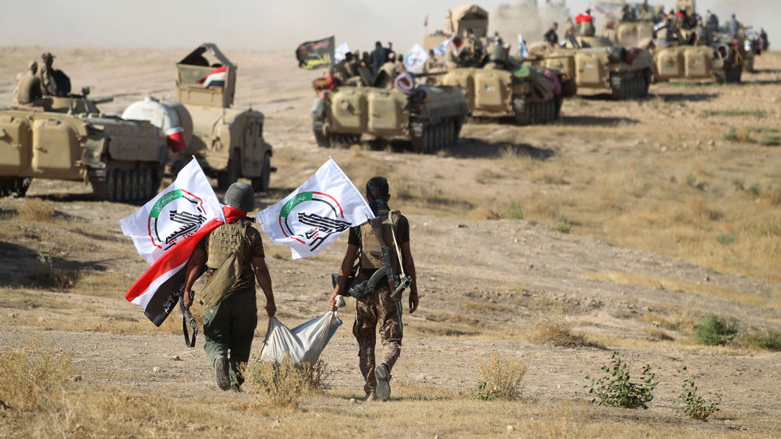Shia militias withdraw from disputed territories in Iraq’s Nineveh: Officials

ERBIL (Kurdistan 24) – Iranian-backed militias have retreated from a number of areas west of the Tigris River in the Nineveh province, according to local officials which have labeled the move “dangerous” as it could lead to the re-emergence of the Islamic State (IS).
Iraqi forces and the Shia militias, known as the Hashd al-Shaabi or Popular Mobilization Forces (PMF), took control of most of the disputed areas between the Kurdistan Regional Government (KRG) and the Federal Government of Iraq following last year’s referendum on independence for the Kurdish semi-autonomous region.
According to an order Kurdistan 24 obtained, the PMF has decided to eliminate certain Centers of Operation in Nineveh, deeming the “stability and security situation” in the province under the command of the Iraqi Prime Minister Haider al-Abadi, who is also the Commander-in-Chief of all Iraqi armed forces, no longer warrants their presence.
“It was decided we would remove our operations command centers in western Nineveh, eastern Nineveh, and Baiji and consolidate our efforts in a newly-establish headquarters for the leadership of the Nineveh Operations led by Ali Kazim,” the document, issued on Aug 2 and signed by the deputy chairman of the PMF, Jamal al-Ibrahim and known as Abu Mahdi al-Mohandis, read.
It was also decided to move the militias’ 40th brigade from the north of Sinjar (Shingal) back to its original headquarters at Speicher base in Tikrit, transferring the security file to the joint operations command in Nineveh.
The Shia militias also announced the full withdrawal of its forces from the bordering area in western Nineveh, which will gradually be taken over by the main Operations Command in Nineveh.
The document mentioned that the PMF decided to remove its 14th brigade from Nineveh entirely. They also reiterated their determination for every militia under their umbrella to vacate the city of Mosul.
Local officials stated that the Shia militias evacuating the area had raised further security concerns among civilians.
“Da’esh members are so close to our borders, we can see them. People are more worried about the security situation now that the Hashd al-Shaabi is abandoning the region,” Nayif Saido, Mayor of Snune town in Shingal, told Kurdistan 24 on Saturday.
“It used to be that with the Zeravani [Peshmerga] forces in our areas, people could peacefully sleep at night. After the Iraqi forces took over [in October last year], the area was also secure, to a certain extent.”
Nayif Badal, the head of the Shingal city council, expressed his concerns and warned that IS might take advantage of the security gap and commit another genocide against the Yezidis (Ezidis), referring to the IS attacks on the ethnoreligious minority in Aug. 2014.
“We ask the Kurdistan Regional Government (KRG) and the federal government of Iraq to protect our areas in cooperation with the US to prevent another genocide from taking place in the region,” Badal told Kurdistan 24.
“Peshmerga and Iraqi forces must jointly be deployed and stationed in our areas as soon as possible.”
Muzahim al-Hewitt, a spokesperson for the Nineveh Arab Tribes, also stressed his concerns regarding the security vacuum in the region, and most recently, the departure of the PMF.
“We, as Arab tribes, demand the return of the Peshmerga forces to the area because only the Peshmerga were capable of eliminating Da’esh [IS]. We demand Peshmerga be deployed in the areas the Hashd al-Shaabi have evacuated,” Hewitt told Kurdistan 24.
Editing by Nadia Riva
